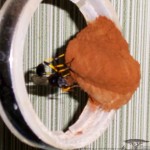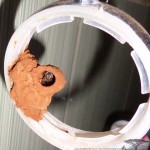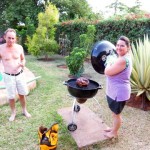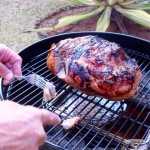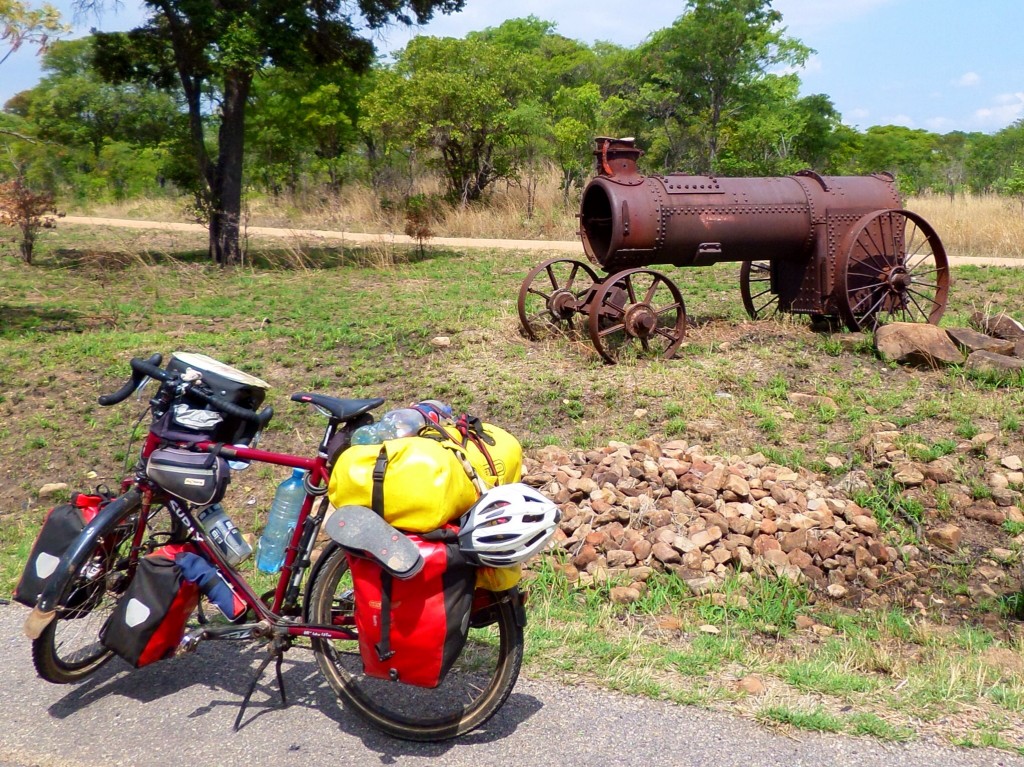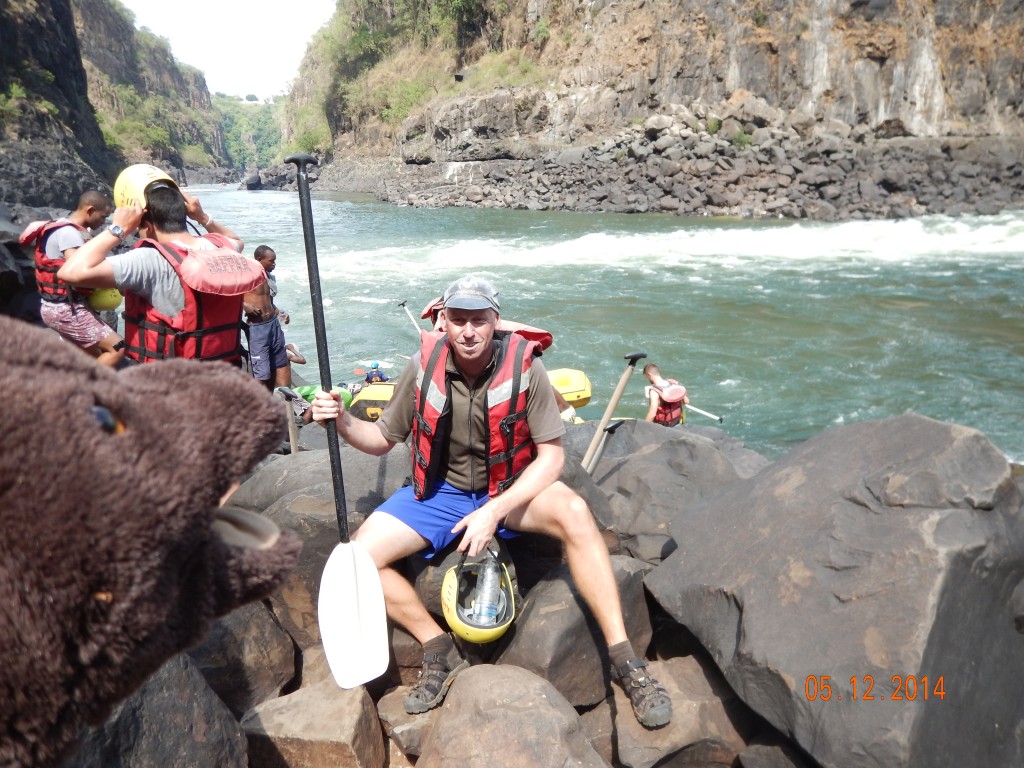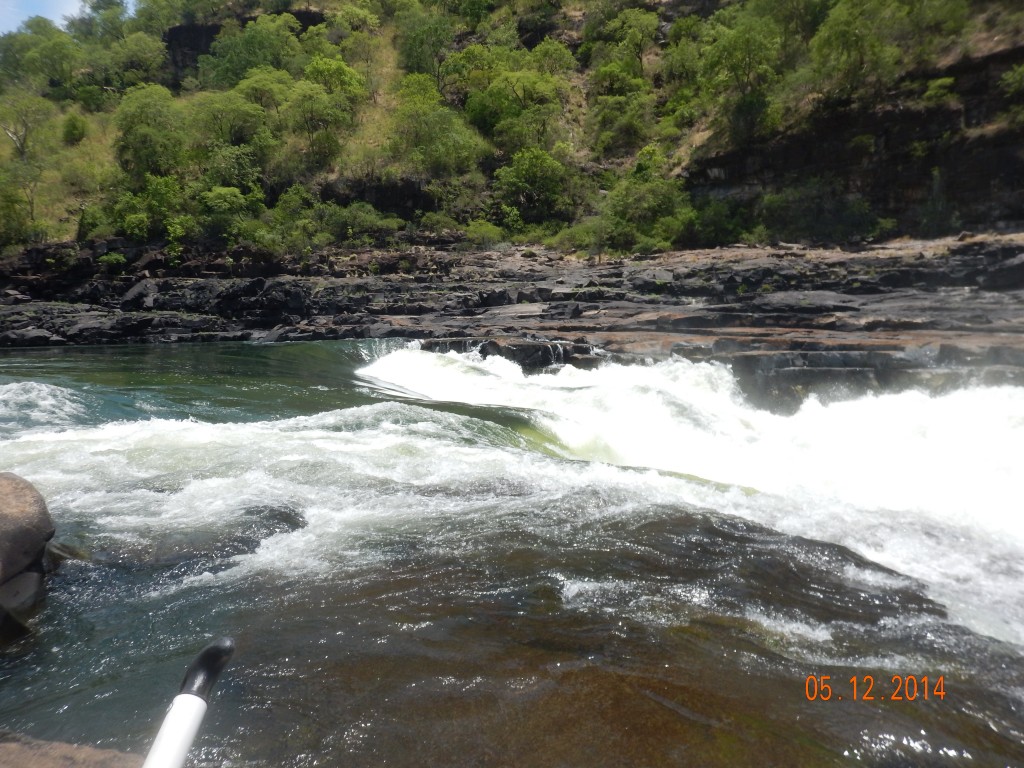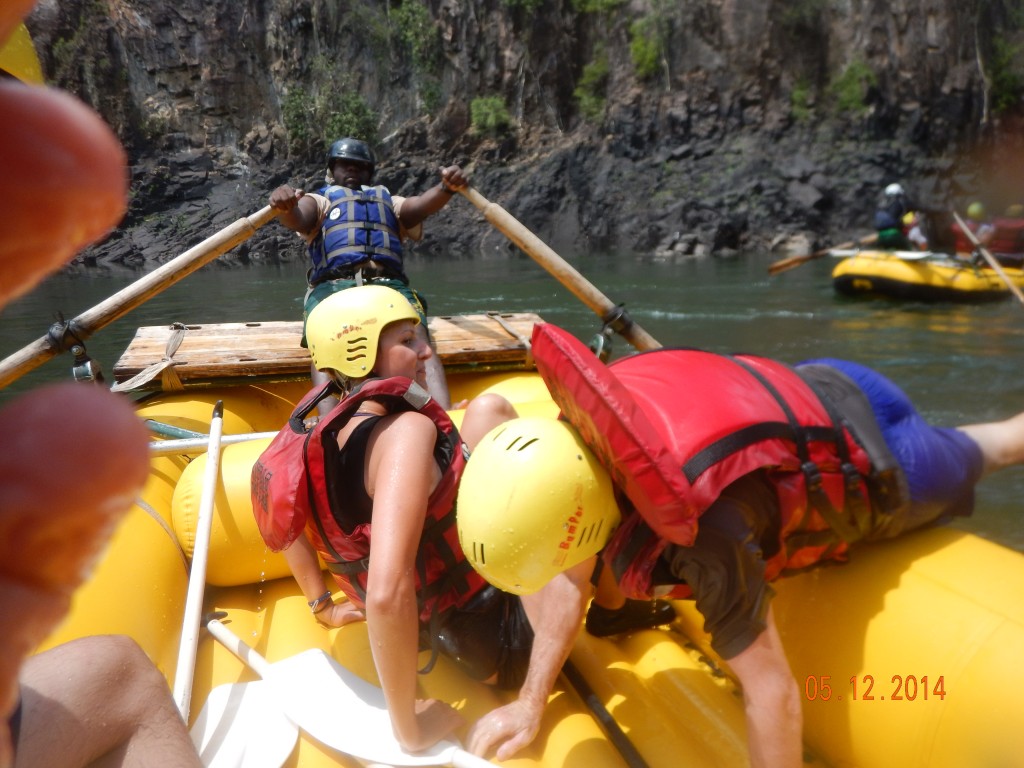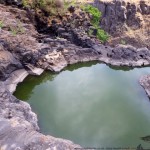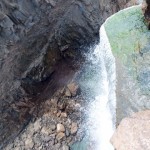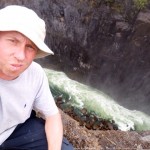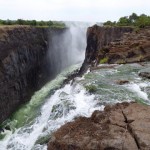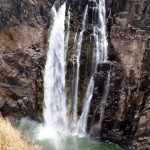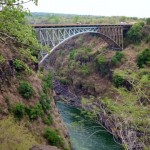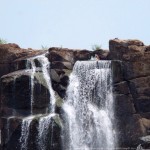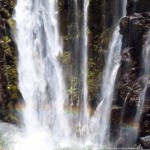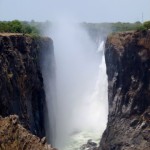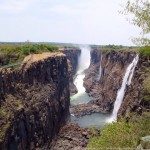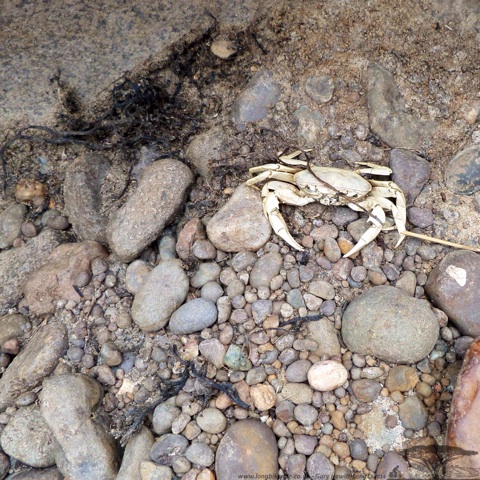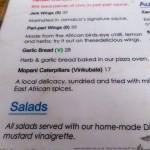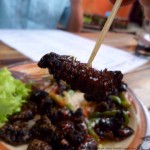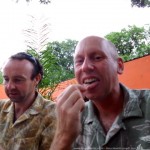Finishing off my relaxing time in Lusaka, lazily doing not a lot, riding into town meeting Dave Conroy for another beer and despite being told I’d die cycling at night, riding back to Mike and Jills house after. Taking note of how the local cyclist in Zambia ride, Salmon style, upstream on the wrong side of the road, I chose to do the same at night. Defensive Cycling to the extreme. Seeing cyclists on the wrong side of the road coming toward them to Zambian motorists is the norm, it allows cyclists to see vehicles coming their way and not moving around . After riding 10 miles in the dark I was very aware why this is normal practice having myself to take evasive off road action a couple of times despite my bike being well lit.
In some African countries Guy Fawkes night is still celebrated on November 5th each year, due to the death of the Zambian President Michael Sata all celebrations had been put on hold including Bonfire night. Baobab college where Ronan and Matthew attended and Jill worked just up the road were having there bonfire night celebrations almost a month late. The Rugby was on in the Afternoon Wales vs South Africa and Mike and I watched the Rugby at the Lusaka Country club meeting the rest of the family later on at the event.
Arriving at the event there were queues of vehicles for entry to the college, the car park being a field next door, full already with row after row of vehicles, this was a big party!
Meeting up with Jill and the boys we settled down to watch the display which went on for an age. I didn’t know what to expect of a firework party in Africa, with a happy vibe the fireworks were spectacular, people cooking on their own barbecues, known as braais locally and the first time I have worn only shorts
nd a t-shirt to a Guy Fawkes night.
During the week in Lusaka there was one regular visitor; flying in through the bathroom window was a wasp, unlike any wasp we see in the UK. Bigger and a solitary creature it started to build capsules from mud. Each day it added more chambers and in each one it places a paralysed insect and an egg. The poor paralysed insect being the food for its young.
- Wasp making a cocoon
- The poor victim inside, half sealed
Sunday evening my last at the Thisteltons was to be braai night. Mike setting up and placing a big pork joint on the grill. Smelling the aroma of the joint cooking in the late afternoon was torture and served to make me salivate in anticipation. Our last evening together was great, lots of drinks, chat and laughter.
- Voila – Pork done to perfection
- MMM… Pork on the Braai
Across the road from where Mike, Jill and family live is the Eureka Lodge, where I would have probably stayed had I not been welcomed to their house. I popped over one afternoon to take a look, have a beer and to see what the place was like. It’s a nice camp with wildlife walking around the place and I saw my first Zebra in Africa.
Whilst I was there I bumped into a Belgian couple Sam and Hanne driving a Landrover from Cape Town travelling North. After chatting with Sam for a while, he explained that they had just sold their mountain bikes and still had spare tubes and a chain breaker that they no longer required and that I was very welcome to have them. Thank you, very kind.
Leaving Mike, Jill, Ronan, Matthew, Roy and Alison after a good break and time to recuperate was a little sad, but it was time to move on and keep pedalling.
Leaving Lusaka I come across a new type of road side stall, sat under a tree an old man is tying small bundles of straw together to make thatching. A bit further along the road several small chicken huts of varying shapes and sizes.
As the landscape changes some arable land comes into view, round fields, much like the ones I have previously seen in the USA, round because they are irrigated by massive irrigation units that travel supply the crops with water. I was surprised to see these in Africa.
A few kilometres from Mazabuka I spied a car pulled over in a lay-by. As the door opens I recognised the couple getting out, Craig and Jess who I had met at Wild Life Camp in South Luangwa. They were heading to Livingstone as well, although travelling by car would reach the destination a few days quicker than I.
Riding into Mazabuka I was planning to stop at the only camp site that was showing on my maps4me iPhone app. The receptionist informed me they no longer catered for camping. With the skies looking rather grey and a little ominous, I was keen to find somewhere to put up the tent as soon as possible.
Travelling to the main road I came across a lodge which had a nice grass area at the front and requested whether it would be possible for me to camp overnight. The receptionist again turned me away but suggested I see their other lodge around the corner. Arriving close to dark the overnight manager again confirmed that they didn’t cater for camping, after explaining I only needed some grass he proceeded to show me the back of the lodge where there was a nice grassy area with nice trees and cut grass. Just as my tent was setup he came back and requested I move my tent into the conference room as it was likely to rain. I was also asked whether I would leave by 7 in the morning which is when the owner arrived. I had agreed a fee to be paid in cash overnight which the owner may never have seen.
The ride between Lusaka and Livingstone I expected to take 4 days, on day two I left the lodge early and hit the road at before 7, riding into Mazabuka town centre to find food. Too early for Shoprite the supermarket I went to a smaller privately owned market and procured some rolled oats, honey and milk and then took them to sit outside the bank and eat them. After getting money from the ATM and continuing toward Livingstone.
Bar names and business markings continue to amuse on the journey, one bar being “Pimpers Paradise”.
And opposite a “Fertilirizer Shop”, there were more that I was travelling too well to stop for like the “Blue Tarven”, which was painted bright red with Airtel logos, yes Tavern was spelt incorrectly.
A little later in the afternoon clouds started to gather, small to start with slowly joining together to make larger fluffy white clouds. I wasn’t far from where I wanted to stop for the day when the clouds became grey and started dumping water in huge quantities in front of me. Turning round back to the village I’d just passed I chatted with a local guy who turned out to be a policeman from Lusaka, home to visit his mother and family. Chris and sat under some shelter, made tea and chatted for a couple of hours until the rains passed.
Once the rain had passed, saying farewell I was on my way again, looking to stop in Batoka. Arriving the choice of lodge or campsite was sparse so decided to continue to find a spot to put up my tent. Stopped by the side of the road having a drink a young woman approached me and started to talk, first wanting to have a ride on my bike. I was then invited to an evening meal with her and her family. Mercy lived just over the railway about ½ a mile and prepared nsima and a freshly killed chicken provided the protein in the meal. After a nice filling meal I was not allowed to put up my tent, I was to sleep in Mercy’s Hut, which was a little awkward, but an experience. As I setup my sleeping mat I was told I was to sleep in the bed and despite my protestations I was still to sleep in the bed and Mercy said she normally slept on the floor! Even my questioning as to why have a bed and sleep on the floor fell on deaf ears. Eventually Mercy slept on my mat whilst I slept on the bed.
As morning came I was keen to get back on the road but first I was to have breakfast which was prepared in a thatched cooking hut.
After a quick photo with the elderly grandmother I continued my journey.
Riding out of Choma further along the route an old farm entrance was marked with an old steam engine from the 1920’s. A reminder of an earlier time.
Stopping regularly for breaks from both riding and the sun and topping up with food, I am normally very careful to ensure I have repacked everything. 10 miles down the road from one stop I noticed the clips on my rear bag still being undone, the clip I normally put my flip flops on. I had left them at the last stop. A 20 mile round trip to go back and get them in the heat wasn’t something I was relishing so decided to try and get some more in the next town. Finding the market a store on the left was able to supply me with new ones, at 7 Kwacha a pair, about 70p, this was 40% more than the Senegalese price, but also worth not having to cycle back for.
The rains came again in the afternoon, just after leaving Zimba with my newly procured flip flops the rains started to dump heavily. A local guy showed me where I could get some clean water, the bottle I had filled up in Zimba being very cloudy and tasting earthy. As the rain came down he said to shelter at his house. As we raced for cover the droplets got bigger and came faster. Seeking shelter just in time the heavens opened and soon the village had a river running thorough it.
In the corner of the room were some bags of seed and fertiliser, maize and ground nut seeds. They were waiting for the rains to soften the ground before planting and enquiring about the fertiliser I was informed the ground is poor, without it the crops will not grow. Many of the farms planting are only subsistence and the soil is not properly turned over, shallow channels being dug with hand tools and the seed placed up to 6 inches below still on a hard compacted surface. I enquired about soil improvement such as adding manure which was unheard of. What was interesting was that the pile of supplies for this years crops came to around 800 Kwacha, about £80.
As the rain stopped late I was again invited to eat with the family, nsima again with fried egg and vegetables, very tasty and in the evening I put up my inner tent to keep away insects.
By the morning one would not have realised how much rain had come down. The ground looking only slightly damp and the roads dry again I pedalled toward Livingstone. Arriving at 10am I headed to Livingstone backpackers where I setup camp and booked a white water rafting trip. Camping was cheap and I knocked off another 10 kwacha during booking in, 35 kwacha a night. Later in the evening the pub over the road started its music with extreme amounts of bass. In all the African Countries so far whenever there has been music, it’s played at such a high volume that its severely distorted, this was no exception. The music didn’t stop until very late and I couldn’t sleep until 1am. If it hadn’t been for the loud music which Livingstone Backpackers are aware of, it’s a very nice camp, swimming pool, nice relaxation areas and a good bar. Unfortunately the music spoils it, at least for me and oldie who’d like to sleep before the early hours. Fine for younger people backpacking or only on a short holiday and not having cycled so far.
Rising early for white water rafting the weather was bright, the vehicle picking me up did so in traditional African fashion, late and in no rush. We headed to the waterfront lodge where the kit is picked up from and a safety talk is given. I paid close attention to this as any injury could potentially end my trip, plus I don’t have travel insurance. The company Safpar was excellent and our raft guide Henry very experienced and knowledgeable. He gave the safety talk explain that the rope around the boat called the “shit line”, reason being that when most people grab hold of it with white water everywhere they are shouting “oh shit!!”.
Post safety talk and a small trip by converted lorry with bench seats, our group arrived at Vic Falls, the porters carrying equipment down to the Boiling Pot rapid a little way on from the falls. Boats in, Life jackets and helmets on we got into the boat. Henry explaining his commands as captain, they were all pretty obvious, “Paddle Forward”, “Paddle Back”, “Stop”, “Get Down” also meaning hold onto the shit line.
Getting across the boiling pot was the first challenge, head toward the top of it and paddle like mad to cross it before you drift into the 90 degree bend and the rocks at the bottom. Our boat only had 5 people in it, meaning we were light on power and all being rookies we did hit the rocks, but only just. We were lucky not to turn over.
After we continued downstream. Each rapid has its own name and they are graded for technical difficulty. The river being low means the rapids are at their fastest and biggest, an ideal time to be rafting if you like it difficult. Several of the rapids also have various ways of crossing them, you can take an easy or hard option. Our boat wanting to take the hard one nearly every time.
Rapid 5 approached, apparently not too difficult. The boat in front of us flipped… we dropped into the boiling water and so did we. One second you are in the boat, the next underwater. I popped up inside the capsized boat and remembered from the safety talk its not the best place to be and possibly dangerous. After some quick gasps of air I grabbed the line and ducked back under for 2 seconds until Henry righted the boat and I found myself under the boat again, only this time with no nice air pocket, just a big bon the head. Pushing down and swimming out I was once again in open air. My boat mates had started to climb back in which is much harder than it looks and most people need help being dragged in.
Back in the boat, rapid 6 was easy, but again on rapid 7 which is 200 metres long full of rocks things got rough. The boat stayed upright but was thrown violently around and I and another found ourselves ejected into the river. The current is strong and despite wearing a life jacket it easily holds you under for what seems like an age. Eventually I bobbed back up, just at the point where I was thinking “mmm, I could really do with some air now!”, but the respite was for half a second and under again I was sucked. Eventually the water calms and I was able to swim to the boat and get back in. As an example the suction caused by the water pulled off the other persons kayaking shoes, tight fitting slip on neoprene rubber soled shoes. Luckily the safety kayaks who follow the boats were able to pick them up.
Rapid 9 is a no go rapid at this time of year, far too dangerous to go through. The guides beach the boats before and the kayaks go through and wait for the boats to be pushed through unmanned and we join the boats further downstream.
After a short lunch break we continued to rapid 25 where a cable car pulled us up from the gorge. Driven back to the lodge we were fed and shown photos and videos from the day. After watching the video I have a huge amount of respect for the guides on the boats. Most of them use two big wooden oars to steer and control the boats and whilst we are all holding on for dear life they are holding fast, steering the boat and even when it flips only letting go at the last minute to try and ensure none of us are hit by an oar. Within seconds of hitting the water they again leap out of the boiling water like a ninja on speed onto the upturned boat and start to right it and then start to hall in the bobbing tourists.. a bit like the catch the duck at the fairground.
After the rafting I ached all over, my legs swelled up, I had chronic earache from the water being smashed into my ears. It was GREAT! But at $185 a day I could only afford to do it once.
Arriving back at Livingstone Backpackers, I gathered my kit and headed to another backpackers lodge Jollyboys for a quieter night. On the raft was a German man travelling by motorbike, also stopping at Jolly Boys, so after arriving and setting up the tent I was introduced to Peter who he was travelling with and another motorcyclist, Maurice from Ireland.
The campsite although more expensive had a much better atmosphere from the people staying but was also quiet.
Next day the backpackers put on their own transport to Victoria Falls, great saves the hassle of cycling or getting a cab/minibus. Entry for foreigners is 120 Kwacha (£12) or 7 Kwacha for locals (£0.70).
The park is full of baboons.
Stalls tout for business as you approach the entrance gate, but they are not too pushy.
I had bumped into Craig and Jess again earlier, they had told me about a free version of the Victoria Falls Devils Pool. They had paid an illegal guide to show them. First I walked opposite the falls and luckily people were in this free version of the cliff edge pool. Devils Pool costing $50 to get into for 10 minutes.
Mentally noting the tree stump next to it I walked around to find it myself. An illegal guide starting to follow me I explain thanks but I can find my own way. He enquired where I was going and I replied to the free pool. He quickly explained it was shut! I replied that I didn’t think it was but would find out when I arrived at it. It was easy to find although the terrain which is across lots of rocks which are normally covered in water during high season was a little arduous. I arrived at the pool. Fantastic, no one else there, completely free and on the very edge.
I took several photos before lowering myself in, taking great care to feel my way forward.
Before arrival several people had said that the falls are disappointing at this time of year. I strongly disagree, the geology is amazing, the pools wouldn’t be accessible.
- A stranded pool at the top of Victoria Falls
- The edge of the free pool looking down to the gorge floor
- That is a long way down to the bottom of the gorge
- Normally you cannot stand here – Water falling into the gorge
Talking with Geoff from Minnesota another travellers back at Jollyboys the next morning he was about to set off to book onto the Devils Pools tour. After showing him my photos he asked if I’d be willing to guide him and a Dutch couple if they paid for me to get there and my entrance. I agreed and became an illegal guide for a day. Going back with others to take some other photos was great, much better than the selfies.
- small part of Victoria falls
- The bridge to Zimbabwe over the Zambezi near Victoria Falls
- Some other tourists in the free pool, the honey pot
- I can see a rainbow, see a rainbow
- The mists coming up from Victoria Falls
- looking down the length of the falls in dry season
Among some of the pools there are dried freshwater crabs, stuck in their rockpools as the water recedes in dry season and left to a fate of being dried out in the baking hot sun.
Maurice, Geoff and I all got on well and we started visiting places together, the banter merciless and something I had missed from being away from the club rides and District club.
We visited the railway, shops (got a silk shirt for 15 kwacha), night clubs, bars and restaurants and even went for a local dish of Mopani caterpillars one night, quite tasty but ours I think were overdone, no squish and all crunch.
The waiter looked a little surprised to see we’d eaten them all.
- Mopani Caterpillars on the Menu
- Mmm – Crunchy Caterpillar
- Celebrity Jungle – Don’t know what the fuss is..

